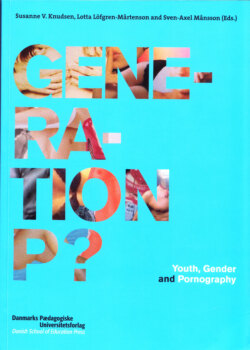Читать книгу Generation P? - Группа авторов - Страница 15
На сайте Литреса книга снята с продажи.
New ethical directions
ОглавлениеThe recognition that public spheres have become sexualised, the problematization of this phenomenon, and not least the problematization of pornography’s status in our culture, may be seen as a cultural evaluation of the history of sexual liberation in the last three decades. In this sense that process of evaluation has opened a new and rather exceptional field for the cultural negotiation of sexuality and the ethical standards of the sexual culture. It is new and exceptional because these kinds of negotiations have paradoxically been complicated by the ideas of emancipation we inherited, not only after 1969, but (in a Nordic context) also from the cultural radicalism in the 1880s and the 1930s. Through the ‘hypothesis of repression’ the French philosopher Michel Foucault has described how explicit talk about sexuality in the 1960s was seen as liberating in that it counteracted an idea held previously (especially in the Victorian era) that people should maintain absolute silence on the topic of sexuality (Foucault 1976). However, Foucault’s point is that, with regard to sexuality – even in the Victorian era – people were not silent to the extent that has been advocated, but on the contrary a flod of new concepts on the topic of sexuality expanded opening up new possibilities with regard to sexual preferences.
According to Foucault, the idea of a past ‘stamped with taboos’ created the idea of sexual emancipation through speech. This ‘hypothesis of repression’, which Foucault then problematises, has established itself as truth to such an extent that even rudimentary criticism of more recent sexual-cultural developments has been categorised and rejected as moral prudishness, or even as an attempt to reinstate the sexual taboos of the past. Departing from Foucault’s viewpoint the Danish philosopher, Peter Thielst, in his recent books criticizes the new sexual culture, created in the name of liberation, for not seeking new ethical standards for sexuality (Thielst 2000, 2002). He calls attention to the paradox that even for liberated sexual speech boundaries still exist with regard to admissible topics. Thus, it has been practically impossible to criticize the sexual emancipation project and the present sexual culture. Thielst is warning us, however, that we betray the cultural changes if we give up being critical in fear of being regarded as prudish and as moralists. In his perspective, we have placed ourselves in a position where we have little influence on the changes within the sexual culture and therefore risk ending up in a situation which “may be characterised more like spineless liberation than a determined conquest of new values and ways of living” (My translation).
Even though I have great respect for Thielst’s analyses and agree with him in many respects, I do not agree with his pessimistic conclusions. Actually, I see the present discussion of the sexualisation of the public sphere and the criticism of the status of pornography as well as the porn chic trend precisely as attempts to create the new ethical orientation that Thielst calls for. It is correct that we are unaccustomed, and perhaps even uncomfortable with these discussions, but the fact that we commit ourselves to these discussions does, after all, give evidence to the idea that sexual liberation is constantly being redefined in a continuous cultural process of negotiation.
